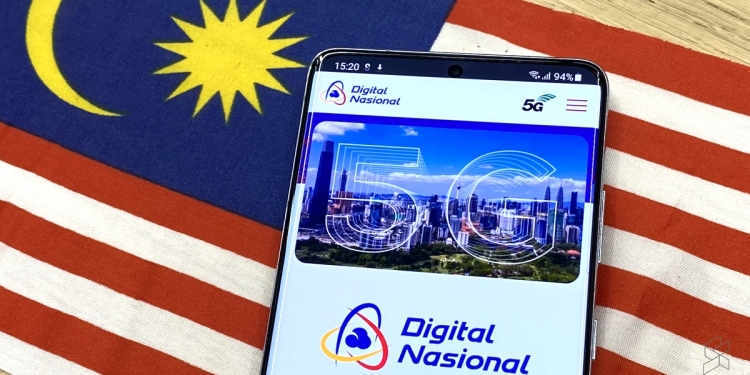Digital Nasional Berhad (DNB) has issued a statement to respond to our post calling for Malaysia’s 5G Single Wholesale Network (SWN) model to be relooked into. DNB says its wholesale pricing will allow significantly better value for the Rakyat and the SWN deployment would be the best way to accelerate Malaysia’s launch of 5G and to catch up with our regional peers.
DNB says DWN is not in the national interest
According to DNB, the Dual Wholesale Network (DWN) proposal has been deliberated by the previous government and was found to be not suitable for Malaysia. DNB says the introduction of a second 5G network would have significant national implications that would delay deployment and increase the cost of 5G deployment.
It explained that splitting the current 5G spectrum between two networks would cause inefficient use of the spectrum. The sharing of spectrum with a second network would entail more 5G sites being required to meet the same mobile traffic demand and DNB would need an additional 8,000 sites to provide the same coverage and committed quality of services. As a result, DNB claims that peak speeds would drop by 50% and this would limit high-speed 5G enterprise use cases.
Since there’s a need to build and maintain additional 8,000 sites, DNB would require an additional RM5.4 billion in incremental funding. This would increase the rollout cost from the current estimated RM16.5 billion to RM21.9 billion. On top of that, these extra sites would take an additional 2-3 years to roll out just to achieve the same level of coverage and quality of services.
DNB said these factors drive up the cost of 5G, leading to a higher price to serve customers. They added that a second consortium may not have a clear separation between its wholesale and retail operators, which would lead to reduced competition.
Efficiency concerns on refarming existing spectrum, sharing spectrum for 4G and 5G
The company also emphasised that the 5G SWN model is envisaged to avoid duplication of infrastructure, optimise the use of scarce resources such as spectrum and promote service-based competition. It said refarming of spectrum would not be feasible as it would not be efficient to carve out sufficient spectrum to deliver a minimum 100Mbps download speed at the cell edge. It added that using Dynamic Spectrum Sharing to use the same spectrum for both 4G and 5G would also result in reduced spectrum efficiency and is unlikely to achieve the aforementioned minimum 100Mbps at the cell edge.
DNB’s wholesale pricing is to be reviewed every 18 months
Although DNB’s current 5G wholesale pricing is listed at RM30,000 per Gbps per month with a 10-year contract period, DNB said the Access Agreements signed by the telcos are governed by the Mandatory Standard on Access (MSA) which went into effect in November 2022. However, the Mandatory Standard on Pricing (MSAP) which governs wholesale pricing is still presently being reviewed and will take effect in 2023.
DNB has confirmed that it has not commenced billing for wholesale services which are currently provided to the five telcos – Celcom, Digi, Telekom Malaysia (Unifi), U Mobile, YTL Communications (Yes 5G), and they will only start billing in 2023. DNB says they have agreed to conduct a review of 5G wholesale pricing every 18 months, either by an independent party or via the MSAP.
DNB is currently under review over transparency and pricing concerns
After the change of administration, Prime Minister Anwar Ibrahim said that the government will review Malaysia’s current 5G deployment plans via DNB. He said it needs to be reviewed due to concerns that it was not done in a transparent manner and there was no tender.
Communications and Digital Minister Fahmi Fadzil assured there’s no delay in the current 5G rollout by DNB but his ministry will assess the current 5G deployment and options available.
DNB has recently issued a statement that it will be able to exceed its own 40% 5G population coverage target by the end of this year. Despite deploying fewer sites due to supply chain issues and delay in securing local council approvals, DNB is forecast to achieve 41.8% 5G population coverage by 31st December 2022 with 3,500 5G sites. Its technology partner Ericsson says DNB’s 5G rollout is one of the fastest in the world having commenced deployment only in October 2021.
Related reading
- DNB: Malaysia’s 5G rollout is one of the world’s fastest, to exceed 40% coverage by end of 2022
- Fahmi Fadzil: Malaysia to assess current 5G deployment, concerned with delay and cost to rollout
- DNB’s 5G network now covers Kuching and Kota Kinabalu
- Anwar: Malaysia to review 5G deployment plans through state-owned DNB







